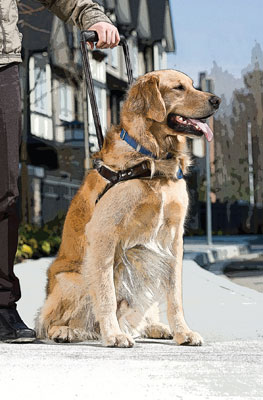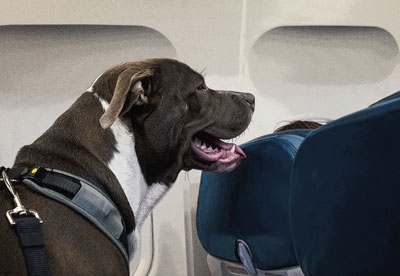Supporting real assistance animals
Is that cockatoo riding a man's shoulder in the produce section really an emotional support animal? Even if so, should it be there?

In June, a passenger on an airplane was bitten by another passenger's emotional support dog. Could someone board an airplane claiming that a snake is a service animal?
Then consider the blind young woman who trained her service dog to run with her. Or the widow who has always had anxiety and got a letter designating her dog as an emotional support animal so she could move into an apartment that usually does not allow pets.
According to AVMA leaders, veterinarians can provide support for clients who have service animals or emotional support animals while discouraging fraudulent representations of pets as assistance animals.
Two members of the AVMA Steering Committee on Human-Animal Interactions presented a July 23 session at AVMA Convention 2017 in Indianapolis on "Emotional Support Animals: Your Role as a Veterinarian." The AVMA House of Delegates, meeting in Indianapolis ahead of the convention, passed a policy on "The Veterinarian's Role in Supporting Appropriate Selection and Use of Service, Assistance and Therapy Animals."
The AVMA also is providing other resources to assist veterinarians whose patients include assistance animals. Among these is the recent AVMA report on "Assistance Animals: Rights of Access and the Problem of Fraud."
Scenarios for veterinarians
Presenting the convention session were Aubrey Fine, EdD, a psychologist at California State Polytechnic University in Pomona, and Dr. Oliver Knesl, a veterinarian with Zoetis.
Dr. Fine explained that service animals are trained dogs or miniature horses that perform tasks for people with disabilities and are covered by the Americans with Disabilities Act. Emotional support animals act as comfort animals and are covered by the Fair Housing Act and Air Carrier Access Act but not the ADA.
Therapy animals—most commonly but not always dogs—are trained animals that are integrated into various health care environments as a complementary form of therapy as well as used to provide comfort and support for people in various settings, including hospitals, schools, hospices, and retirement homes. Therapy animals are not covered under the ADA, FHA, or ACAA.

"When you see people walking around with jackets on their animals, it isn't clear who is who," Dr. Fine said. Then there's the problem of fraud, with some animal owners getting a certificate online so their animal can fly free in the cabin of an airplane—on the floor or the owner's lap—or because they want to take their animal to various places it wouldn't usually be allowed to go. Now, people with disabilities are being questioned for having an animal with them.
Dr. Knesl presented three scenarios for veterinarians. In the first, a client asks for a letter documenting that her dog is her emotional support animal so she can move into an assisted living facility. However, Dr. Knesl said, it is a licensed mental health professional who must write the letter. He explained, "View it in this way: The pet is being prescribed by a human health professional for a person with a particular disability."
In the second scenario, a veterinarian examines a service dog. According to Dr. Knesl, the veterinarian can ask what tasks the dog performs, but cannot charge more for the examination should it take longer than usual because of the veterinary implications of the dog's role. The veterinarian also should refrain from recording information about the client's disability in the dog's medical record.
In the third scenario, a veterinarian teaches a module on the welfare of laboratory animals, and that involves a visit to a pathogen-free rodent facility. A student has permission to bring his emotional support dog to class per university policy, but is it reasonable to bar the dog from the pathogen-free laboratory?
I think it's critical that we as veterinarians do not relinquish our voice in this issue.
Dr. Wendy Hauser, delegate for the American Animal Hospital Association to the AVMA House of Delegates
There is no legal requirement to provide access for an emotional support animal to an educational facility, Dr. Knesl said. In deciding whether to provide access voluntarily to the laboratory, the veterinarian teaching the module should carry out an objective analysis of whether the animal's presence would result in a fundamental alteration to the nature of the activity, such as by endangering the laboratory animals' health or welfare. Ideally, Dr. Knesl said, if the emotional support animal cannot be admitted, alternatives should be investigated to give the student an equivalent educational experience.
A voice in the conversation
On July 20, the AVMA House of Delegates discussed assistance animals during its Veterinary Information Forum in Indianapolis.
Dr. Gail Golab, AVMA chief veterinary officer, said there is an opportunity "for the profession to be able do the right thing for these animals and for the clients who own them." She said it is important for veterinarians to understand the unique needs of assistance animals and customize recommendations accordingly.
Public access for these animals is important to their owners, she continued, but access varies depending on spaces and laws. There also are differences in definitions of assistance animals and expectations for public access.

"I think it's critical that we as veterinarians do not relinquish our voice in this issue," said Dr. Wendy Hauser, delegate for the American Animal Hospital Association. When on flights with emotional support animals, she worries about the safety of humans.
Dr. Cia Johnson, director of the AVMA Animal Welfare Division, said the AVMA is reaching out to a variety of other professional organizations so veterinarians can have a voice in conversations about assistance animals. Some of these organizations are human-focused, some animal-focused.
Later that day, a House committee deliberated further on the issue. Dr. Johnson said a veterinarian's role has to do specifically with the assistance animal. She said, "So we're trying to make sure that it's being cared for appropriately, that it's suited to the job it's supposed to do."
Dr. Cathy Lund, alternate delegate for Rhode Island, suggested creating a form for veterinarians with bullet points such as that an animal has the appropriate temperament and is not a zoonotic disease risk. The AVMA is working with mental health professionals toward such a form, Dr. Johnson said.
Emily Patterson-Kane, PhD, an animal welfare scientist with the AVMA Animal Welfare Division, said veterinarians would not be signing a certification, and any liability attaches to the human health care professionals. She continued, "We need to work directly with the people prescribing and training these animals in order to find some way to very simply communicate the demands being placed on the animal and, therefore, the extra preventative and other care that animal might need."
AVMA efforts
On July 21, the House of Delegates passed the new AVMA policy on assistance and therapy animals. According to the policy, "Veterinarians have a role in assisting their clients in selecting the right animal for the right task, recommending that the animal receives appropriate training for its intended role, and ensuring that the health and welfare of that animal is addressed." Furthermore, veterinarians "should discourage inaccurate or misleading descriptions."
In addition to the policy, delegates approved three recommendations to the AVMA Board of Directors regarding assistance animals. The House recommended creating educational materials on assistance animals to educate the public, veterinarians, businesses, and human medical professionals; advocating for unified definitions for service, assistance, and emotional support animals; and creating a working group that includes human health care providers to develop communication materials in support of the exchange of information between human health care providers and veterinarians.

The AVMA has created a webpage that provides an overview of service, emotional support, and therapy animals, with a link to the April 2017 AVMA report on "Assistance Animals: Rights of Access and the Problem of Fraud." Also being developed is an AVMA brochure with guidance for veterinarians on assistance and therapy animals.
Reducing fraud
The AVMA report on assistance animals discusses the "perceived increase in problems caused by people fraudulently identifying their pet as an assistance animal to gain access and/or avoid pet fees." According to the report: "This has led to calls for more regulations related to obtaining and identifying an assistance animal. Opponents, however, argue that a case can be made for permitting public access to any animal that accompanies a person and provides them some benefit, including companion animals, so long as those that are unsuitable, uncontrolled or dangerous are identified and denied access."
According to the report: "Part of the problem is that the lack of a centralized or standardized form of proof that can be used to ascertain an assistance animal's status makes fraudulent animals difficult to identify. The ADA does not require any standardized training or certification program for service animals, nor does it require the handler to provide any form of documentation stating the necessity for a service animal. Such documentation is considered a barrier or unreasonable burden that could limit access to a service animal. Conversely, people who use ESAs may need to provide documentation stating the need for an ESA, but that documentation can be easily counterfeited."
Approaches to remedying current challenges could include reconciling conflicts in federal and state laws, having clear and consistent definitions, reducing availability of fraudulent materials, increasing access for companion animals in housing and public spaces, and increasing access for emotional support animals.
AVMA POLICY
The Veterinarian's Role in Supporting Appropriate Selection and Use of Service, Assistance and Therapy Animals
Service, assistance and therapy animals provide valuable help, support, and comfort for people. Once it has been determined that use of a service, assistance, or therapy animal is appropriate, veterinarians have a role in assisting their clients in selecting the right animal for the right task, recommending that the animal receives appropriate training for its intended role, and ensuring that the health and welfare of that animal is addressed.
The AVMA encourages veterinarians to be familiar with the legal status and protections accorded to service, assistance, and therapy animals and their owners, and should discourage inaccurate or misleading descriptions of these animals' roles (e.g., "emotional support animals" status should be supported by a statement of need from a licensed mental health professional). Veterinarians should work collaboratively with their human health and other human service-provider colleagues in developing and supporting guidance for the appropriate use of animals for therapeutic purposes and to assist people with disabilities.
Related JAVMA content:
AVMA to deliberate on assistance animals, stem cells (June 1, 2017)
Policies clarify animal-assisted interventions (June 1, 2015)